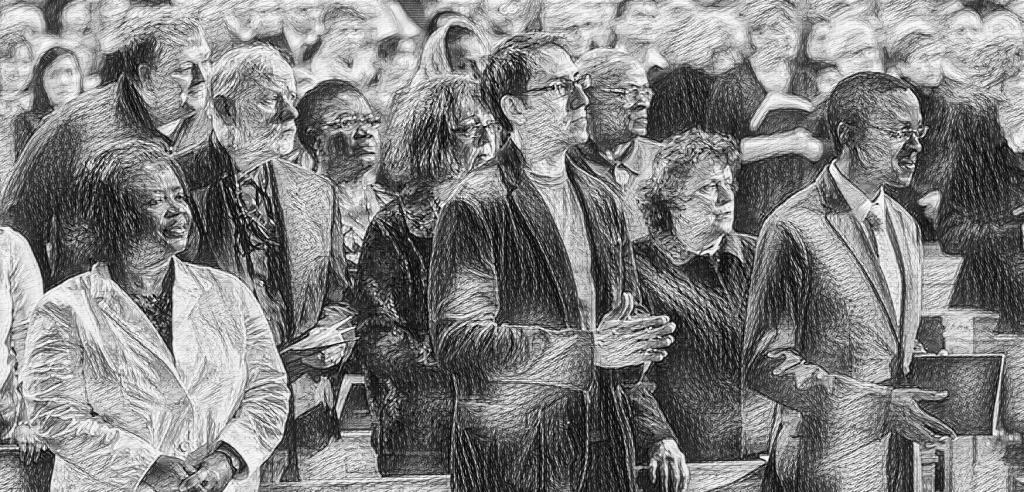
The celebration of the Lord’s Supper or the Mass is by divine command from Christ. Our Lord tells the apostles, “Do this in memory of me.” The priesthood and the Eucharist remains to this day a marker for the presence of the Church. Any Christian affiliation that lacks these elements may be an ecclesial community but is not a “church” in the true or full sense. The Eucharist is the re-presentation of Calvary and the one form of worship that truly honors God and is received by the Father. It makes possible the remission of sins. It allows us to offer ourselves with Christ. It makes the risen Christ accessible as a real and saving food— his body and blood— present in his humanity, body and soul as well as in his divinity. The one-time offering is repeated so that we can take advantage of the great mystery for the good of souls around the world and throughout the centuries. Participation at Mass signifies fidelity to the commandments in keeping the Lord’s Day as well as obedience towards the precepts of the Church. Such laws are given us, not to threaten our people with hell but because Mother Church desperately desires her children to be in a state of grace and to be fed with the saving food of the sacrament. Every Mass brings us to the paschal mystery: the passion, death, resurrection and ascension of Christ. The early Christians found themselves expelled from the synagogues. They would gather on the eighth day or Sunday or the Lord’s Day to celebrate the ritual given by Christ. The Scriptures were read, including the letters or testimonials of the apostles. The oral tradition would eventually be composed and we would have the various Gospels to share. The Church was ministering and worshipping before the canon of the New Testament came into existence. The first Christians took fellowship with one another, were formed in the truth and broke bread together. While the sacrament in the weekly agape feast was joined to a regular meal; in time it would be separated out. The emphasis would become entirely fixed on the Eucharist and the bread of life and the chalice of salvation.
Usually omitted on weekdays, a distinctive feature of the Mass on Sundays and other holy days is the Profession of Faith or the Creed. All stand to profess the central truths of the Catholic faith. These elements of faith did not come easy for the Church. The formulations came with intense theological reflection, the refutation of heresy and the consensus of bishops at councils. They invoked the protection of the Holy Spirit and trusted that God would protect the Church he had instituted from doctrinal error.
There is no secrecy about the revelations of God although we are fortunate to be living after the death of the last apostle, the end to public revelation and at a time when the saints have had centuries to ponder the truths of God. Revelation has ended but there is growth or organic development in our appreciation for the tenets of belief. This is in part due to exploration of the past but also because of dialogue with the world and/or modernity. Catholic truths are timeless but they are never stagnant. Ours is a living faith, not a dead one.
We say “I believe” and join not only our fellow congregants but all those at Mass around the world, East and West, and throughout two millennia of history. At Christmas the bow becomes a bended knee at the words that recall the overshadowing of the Holy Spirit upon Mary and the moment of the incarnation when God becomes man. He comes to make a home with us so that one day we might have a home with him in heaven. The All Holy one makes himself a helpless child and thirty-three years later he would fully realize this vulnerability on the cross so that sins might be forgiven. The Mass is a sacramental re-presentation of this mystery. The altar is both manger and cross. The Christ Child is placed into a feedbox for animals. The altar is our source of spiritual food for men and women— the REAL presence of the risen Christ. We receive his body and blood in Holy Communion. The risen Christ miraculously offers himself to the Father as an acceptable sacrifice. He makes himself into the rations from heaven for a pilgrim people. It is upon the altar that we will have the clean or unbloody re-presentation of the oblation of Calvary. The saving work of Christ cannot be restricted to any time or place. It breaks through the boundaries of a temporal world and touches in the sacraments all who would believe in the family of God.
Filed under: Uncategorized |















































Leave a comment